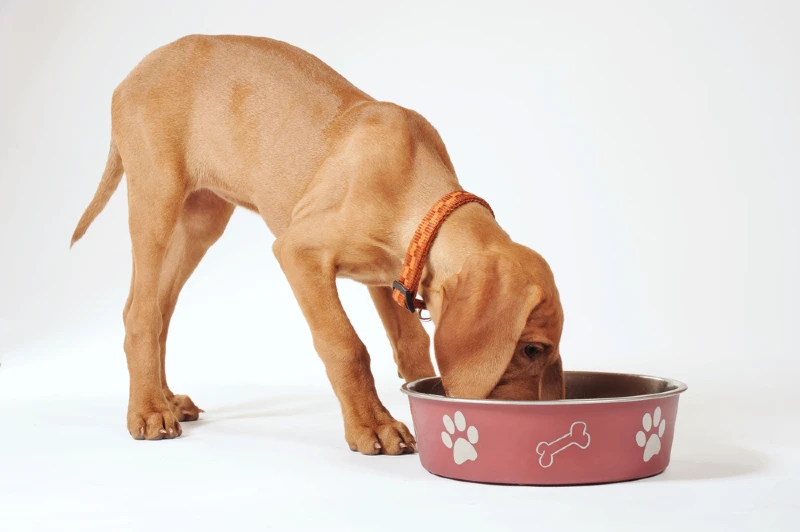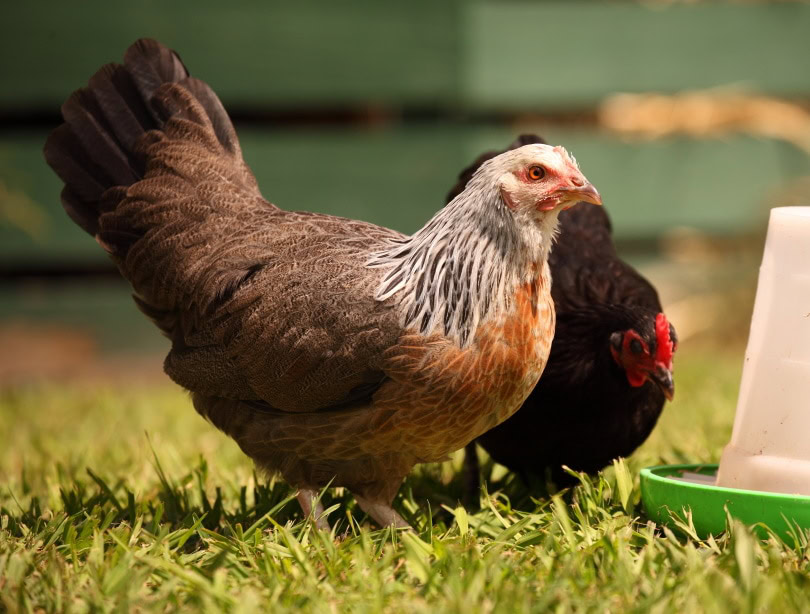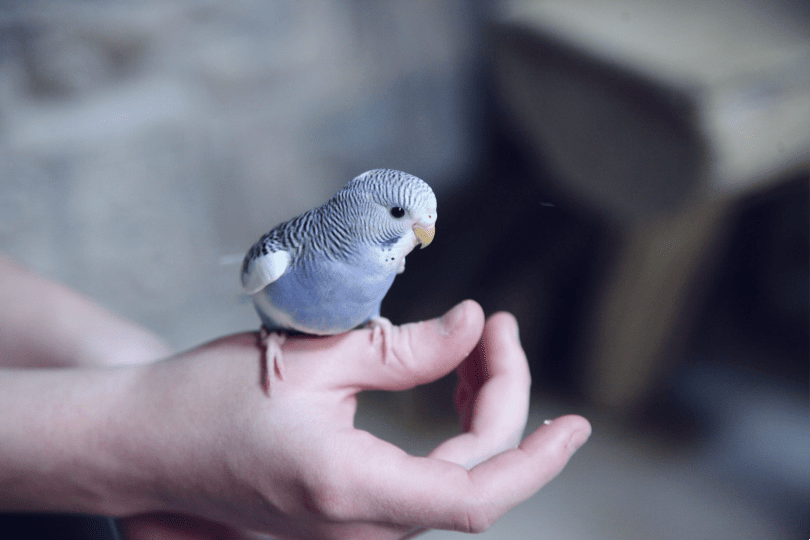VET APPROVED

The information is current and up-to-date in accordance with the latest veterinarian research.
Learn more »Click to Skip Ahead
Every dog owner knows that a good diet is crucial to their dog’s overall health. But sometimes, even their full stomachs don’t stop them from eating like somebody wants to steal their food!
Many breeds, like Labradors, are known for eating fast, but sometimes even small dogs can show this behavior. If your dog is eating too fast, you’re in the right place because we’ll tell you why your pooch is eating fast and how to solve this problem.

The 5 Reasons Why Dogs Eat So Fast
1. Competing for Food
Domestic dogs are descendants of wolves, and they left many of their characteristics in the past—but not all. Competing for food is something that they would do if they were still living in the wilderness in packs. The wolves needed to hunt the food and save their food from other predators, so the best way was to eat the food as fast as possible. In some way, your dog resembles the actions of their ancestors.
This behavior often occurs if you have other dogs or animals in your household because your dog sees them as potential food stealers. You will sometimes see that your dog is also growling and showing teeth; they are doing that as a warning that others should stay away from the food. Sometimes dogs also see humans as a potential threat to their food, and if you notice any aggressive behavior, you should go to a professional trainer to solve this behavior.
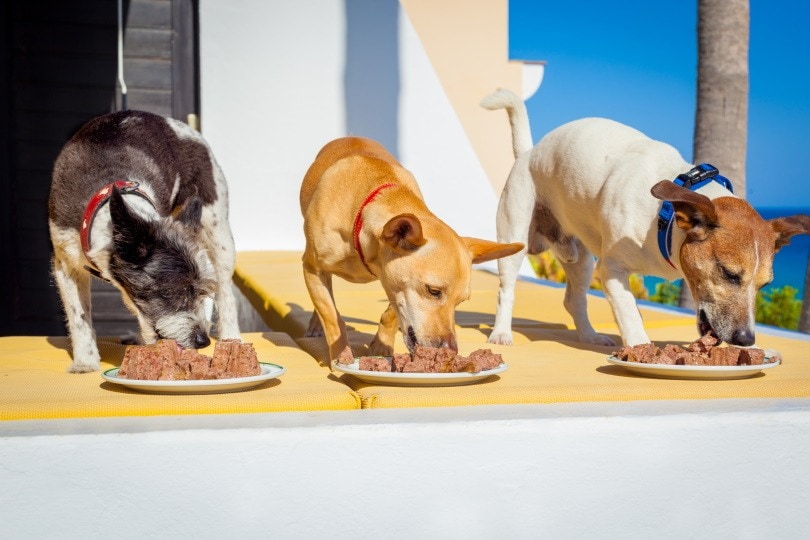
2. Poor Diet
The second reason is that their diet might not be complete and balanced. Fast eating often happens when feeding your dog food that needs to be more well-balanced. Their diet requires high quality protein, carbohydrates, fats, minerals, vitamins, and fiber. They are omnivores, meaning they eat meat and plants. So, when picking the right fit for your dog, try looking for high-quality food that contains all of these nutrients crucial for your dog’s health.
3. Hunger
Eating fast can also simply be a sign that your dog is hungry. Sometimes owners forget to feed their dogs; and when they do, they eat the food fast. That is perfectly normal, but there are instances when the dog has had higher than usual physical requirements, which makes them use a lot of energy, and both of these situations can result in your dog eating rapidly. Your dog’s diet type and amount should be adapted to their caloric requirements.
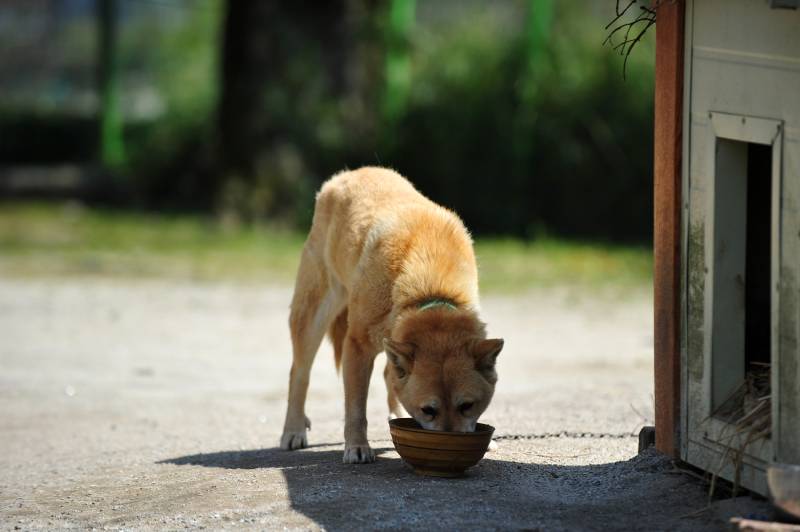
4. Habit
If you rescued a dog from a shelter, they may be confused by the new feeding schedule. For instance, people that cared for your dog before you may have fed them more frequently than you, and your dog got used to that feeding schedule. So, when it finally comes to eating, your dog can’t contain their appetite. When getting a new dog, you should try to adjust your feeding schedule slowly, so there won’t be any problems.
5. Illness
Eating fast can also indicate that your dog may have a health issue that needs addressing. Intestinal parasites and endocrine diseases can cause increased appetite, resulting in fast eating. When it comes to intestinal parasites, the most common are:
- Roundworms
- Hookworms
- Whipworms
- Tapeworms
- Coccidia
- Giardia
All of these parasites usually have other signs, like diarrhea or vomiting, which can cause dehydration and electrolyte imbalances. If you see any of these signs of illness, take your dog for a veterinary check-up to determine the exact cause of the problem.
When it comes to endocrine illness, the most common are diabetes and Cushing’s disease because they cause increased appetite. Other signs also happen in dogs with these illnesses, like increased drinking and urination. So again, if you have any doubts, take your dog to the veterinarian as soon as possible.

Dangers of Eating Fast
Fast eating can cause some problems for your canine companion. When eating fast, dogs don’t chew food properly, and they can’t digest food properly.
Another problem caused by fast eating is gastric dilatation-volvulus (GDV), which can be a life-threatening disease. In these instances, your dog’s stomach twists around itself and starts to fill with gas. A twisted stomach causes bloat and extreme pain. Fast eating can also cause vomiting and gagging.
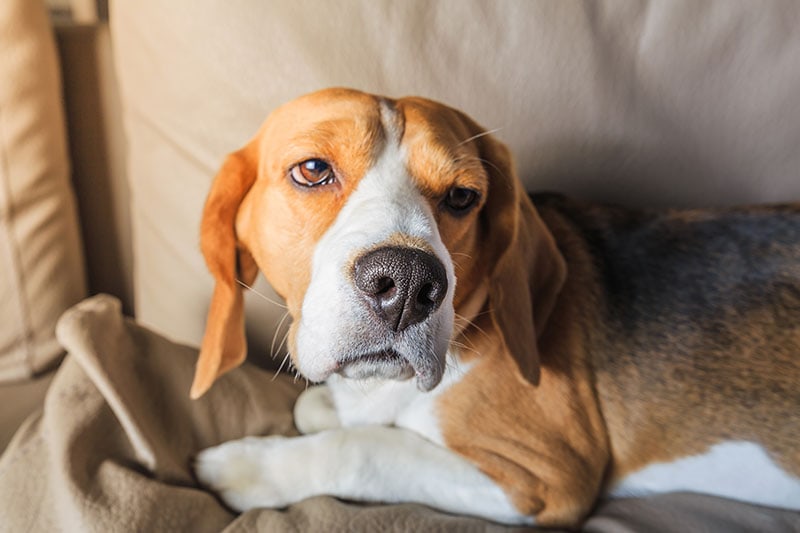
How To Solve This Problem
While there are ways to help your dog eat more slowly, it’s important to first rule out any medical conditions that might be causing them to eat too fast. A visit to your vet can help determine if there’s an underlying issue.
One of the most effective solutions is using specially designed slow-feeder bowls. These bowls have built-in obstacles that encourage your dog to take smaller bites, preventing them from gulping down their food too quickly. While your pup may find it frustrating at first, they’ll adapt over time.
Food puzzles work similarly but add an element of fun by hiding food in small compartments, encouraging your dog to explore and eat at a slower pace.

Conclusion
Some dogs eat food faster because they feel threatened by other animals, some do it out of habit, or they may have an illness you’re unaware of. Either way, your role as an owner is to recognize the root of the behavior, and if you have doubts about your dog’s health, take measures to solve them.
Even if your dog is healthy, fast eating can cause other health problems that can be dangerous to your dog, so it’s best to try and slow their eating down.
- Intestinal Parasites in Dogs
- Diabetes in Pets | American Veterinary Medical Association
- GDV (Gastric Dilatation Volvulus) in dogs – PDSA
- Why Does My Dog Eat So Fast?
- 4 Main Reasons Why Your Dogs Eat So Fast (Tips to Slow)
- Why Your Dog Is Eating So Fast, and How to Slow Them Down
- Best Dog Food: How to Know What’s Right for Your Dog
Featured Image Credit: AndrasKiss, Shutterstock
